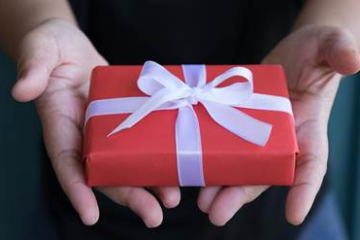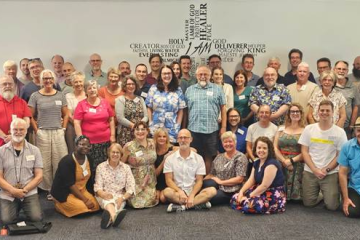John 1:1-18 & Matthew 2:1-12
Late last year I bought a book called Last Christmas. It is not the book of the film – which was a bit of a festive season flop – but a collection of essays and stories about ‘people’s memories of past Christmases and hopes for future ones’ gathered together by husband and wife team, Greg Wise and Emma Thompson from among their friends and acquaintances. They write, “we know almost every one of them or they are only one degree of separation from us – either via a family member, friend or someone we have worked alongside.” So, there are a lot of actors and media folk – as you can imagine – but also refugees and people who’ve been homeless and community service volunteers and one vicar!
And there are many very beautiful essays. It shouldn’t surprise me that Stephan Fry and Ben Elton can write! But the one that has stayed with me comes from Steve Ali, a Syrian refugee, who spent some time in the Calais Jungle refugee camp and who now lives in London and works as a writer, silversmith and interpreter for the BBC, NBC Universal and Refugee Action.
Ali structures his essay around three Christmases – one in the Calais Jungle and two in London – giving each – as a heading – one of the gifts the wise men bring to Jesus, ‘Gold, frankincense and myrrh.’
Gold is the first gift. An obvious gift for a child born to be king, but here is where the obvious ceases. The wise men come asking for the new-born king in Jerusalem, in the capital, in the centre of learning and power, but he is not there. Instead they find themselves presenting this gift of kingly gold to the child of a peasant woman, in a simple peasant home, in the little town of Bethlehem. How could a king be born here? How could God be born here?
In a similar way, it is hard to imagine what Steve Ali can call ‘Gold’ about the first Christmas he describes, celebrated in the Calais Jungle.
He is twenty-three years of age and the temperature is below freezing and he is standing next to a barrel of fire warming his hands and drying his wet clothes. He writes, “I want to tell you there are chestnuts roasting on this open fire but I cannot. There’s not much of a Christmas in a refugee camp.”
Had the war not broken out in Syria,” he goes on, “I’d almost be a qualified architect by now. [I’d be] visiting building sites with my blueprints rolled up under my arm, respected and professional. Instead I am building makeshift shelters in a refugee camp wondering where my plans went….
But the British volunteers in the camp explain that the baby Jesus was once a refugee running from a ruthless dictator too. [that the baby Jesus] was born in a stable. “We have nothing here but hope,” Ali says. “But I am assured by the volunteers, who have celebrated Christmas every year of their lives, that hope for humankind is the true Yuletide Spirit.”
The mystery of incarnation – the king of the universe born in a stable, Jesus, a refugee, God entering all the frailty and vulnerability and disaster-proneness of humanity, ‘the Word becoming flesh and living among us’ – is our hope. It is our golden hope.
What the gospel of John tells us is that the origin of all life, the one “through whom all things came into being” has entered the life of the world, become part of the life of the world. That God has bound Godself with the life and experience and fate and future of all flesh, of all living things.
Whether we are waiting in a refugee camp or contemplating the disastrous effects of climate change or dealing with a host of ordinary fears and heartbreaks that assail us, our hope is that we are not alone in what we face. God is with us.
The second gift is frankincense, a gift traditionally associated with deity, with the act of worship where incense is burned and a bridge, a connection is made with the divine.
Steve Ali’s second Christmas, the one he titles ‘Frankincense’, is also about bridging gaps and building connections. He is now living in London in the spare room of couple, Deborah and Tom, and he goes with them to celebrate Christmas at the country home of family friends in Lancashire.
He writes, “All the Christmas customs are very strange to a Syrian who isn’t Christian and wasn’t allowed to watch Western films growing up. At Eid [the Muslim feast that marks the end of Ramadan] children are given money from the grownups in their family. [Here] children go to sleep thinking an old reverse-burglar man will break into their house and leave presents…. I do not imagine Santa will visit me but in the morning there is not one but three stockings outside my door. It appears that various different people without consulting each other have separately ‘helped Santa’ to make sure my first Christmas is special.”
Frankincense is not among the gifts, but scented bath oil is – along with chocolate and a pair of woolen slippers – all of which – most importantly – “have… been chosen especially for me and not found in a bag of charitable donations.”
“I decide,” he writes, “that my favorite part of a traditional British Christmas is the way you welcome strangers like me into your families. If I were hosting Christmas dinner that would be the most important tradition to include.”
In John’s gospel, incarnation, God entering our world, creates a crisis of judgment for human beings “He came to what was his own,” John says, “and his own people did not accept him. But to all who received him, who believed in his name, he gave power to become children of God.” Welcoming God into our lives – welcoming God even if we do not at first recognise him – paradoxically becomes the means for God to welcome us into God’s life, for us to born into a new family identity, the family of God.
I wonder whether – as we reach out to friends and family and those we do not know during this bushfire crisis – as we perhaps decide that welcoming strangers might be the most important Christmas tradition to include next Christmas – or all year round – we will know more deeply that God is with us – and that we are God’s children.
The final gift is myrrh which has been used throughout history as a perfume or incense or medicine and associated in Christian tradition with embalming oil and, therefore, with death. It is a symbol of the life of God, the life of Jesus, poured out for the world, but as the people who now share God’s life, it is also a symbol of our lives poured out, our sacrifice, our daily offering of our lives to each other.
In the final Christmas Steve Ali describes, the one he titles ‘Myrrh’, he is preparing to go again to the house in Lancashire with Deborah and Tom, but they have offered the flat to another refugee, a young man in his twenties who is a solicitor but had to flee Kurdistan because he is gay and was in fear of being killed because people had found out. He is going to his lawyer’s house for Christmas lunch, but Ali decides to be his secret stocking giver.
He goes to the shops and buys a stocking, but – Deborah tells him – he has unknowingly bought a stocking for a cat. He keeps it and puts in it, “a globe of the earth so he will know the world is his oyster, an Oyster card so he knows the oyster is his London and a pot of Marmite because I figure its best for him to know the worst thing about integration right away.”
He hides it in the flat and leaves a message for young man, so he finds it on Christmas morning. “He is so happy, he cries a little.”
And Steve Ali finishes his essay with this. “Sometimes it takes an outsider to really understand a custom. I realise now, the character in the Christmas story we should all aspire to be is the star in the sky that shines so brightly and hopefully – that someone else who is lost can find their way.”
According to John’s gospel, “No one has ever seen God. It is God the only Son, who is close to the Father’s heart, who has made him known.” In the incarnation Jesus makes God known to the world – makes flesh, makes real, the love and care of God for all living things. And when we welcome Jesus into our lives – into our patterns of living – we are brought close to God’s heart as well. And we too become part of the work of incarnation. We too share the ministry of Jesus as we shine for love and sacrifice for love and even suffer for love so others can see God made known, so others who are lost can find their way.
As we mark the feast of Epiphany in this new year, in this difficult time, may these gifts be yours – the hope of God’s presence with us, the power to be God’s children and the love that shares these gifts, and that in doing so, reveals God to others, that makes our lives worship to our God.


